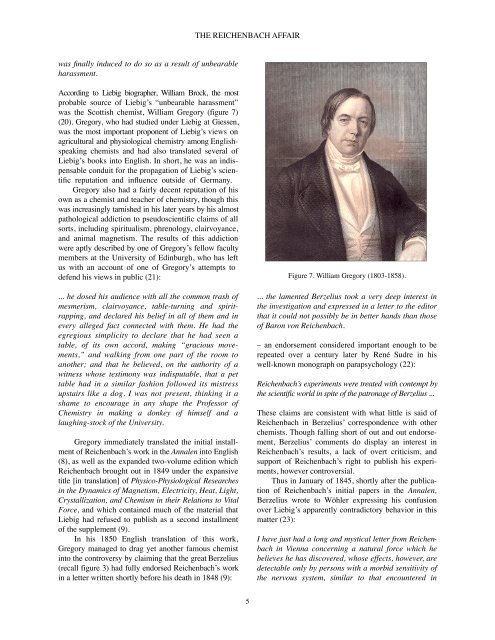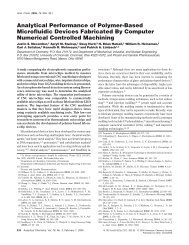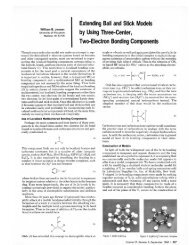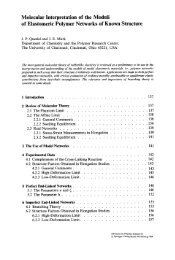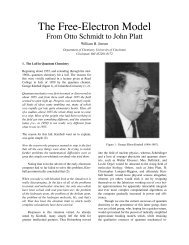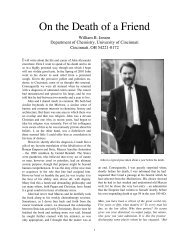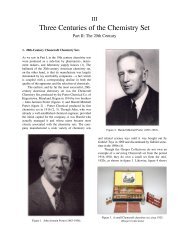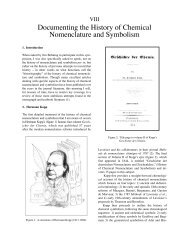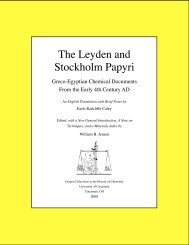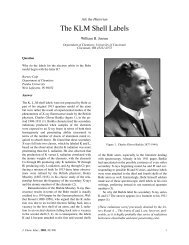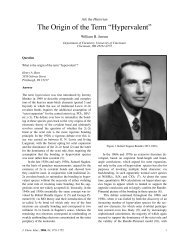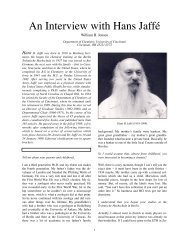Frankenstein's Cat.pdf - University of Cincinnati
Frankenstein's Cat.pdf - University of Cincinnati
Frankenstein's Cat.pdf - University of Cincinnati
You also want an ePaper? Increase the reach of your titles
YUMPU automatically turns print PDFs into web optimized ePapers that Google loves.
THE REICHENBACH AFFAIR<br />
was finally induced to do so as a result <strong>of</strong> unbearable<br />
harassment.<br />
According to Liebig biographer, William Brock, the most<br />
probable source <strong>of</strong> Liebig’s “unbearable harassment”<br />
was the Scottish chemist, William Gregory (figure 7)<br />
(20). Gregory, who had studied under Liebig at Giessen,<br />
was the most important proponent <strong>of</strong> Liebig’s views on<br />
agricultural and physiological chemistry among Englishspeaking<br />
chemists and had also translated several <strong>of</strong><br />
Liebig’s books into English. In short, he was an indispensable<br />
conduit for the propagation <strong>of</strong> Liebig’s scientific<br />
reputation and influence outside <strong>of</strong> Germany. !<br />
! Gregory also had a fairly decent reputation <strong>of</strong> his<br />
own as a chemist and teacher <strong>of</strong> chemistry, though this<br />
was increasingly tarnished in his later years by his almost<br />
pathological addiction to pseudoscientific claims <strong>of</strong> all<br />
sorts, including spiritualism, phrenology, clairvoyance,<br />
and animal magnetism. The results <strong>of</strong> this addiction<br />
were aptly described by one <strong>of</strong> Gregory’s fellow faculty<br />
members at the <strong>University</strong> <strong>of</strong> Edinburgh, who has left<br />
us with an account <strong>of</strong> one <strong>of</strong> Gregory’s attempts to<br />
defend his views in public (21):<br />
... he dosed his audience with all the common trash <strong>of</strong><br />
mesmerism, clairvoyance, table-turning and spiritrapping,<br />
and declared his belief in all <strong>of</strong> them and in<br />
every alleged fact connected with them. He had the<br />
egregious simplicity to declare that he had seen a<br />
table, <strong>of</strong> its own accord, making “gracious movements,”<br />
and walking from one part <strong>of</strong> the room to<br />
another; and that he believed, on the authority <strong>of</strong> a<br />
witness whose testimony was indisputable, that a pet<br />
table had in a similar fashion followed its mistress<br />
upstairs like a dog. I was not present, thinking it a<br />
shame to encourage in any shape the Pr<strong>of</strong>essor <strong>of</strong><br />
Chemistry in making a donkey <strong>of</strong> himself and a<br />
laughing-stock <strong>of</strong> the <strong>University</strong>.<br />
! Gregory immediately translated the initial installment<br />
<strong>of</strong> Reichenbach’s work in the Annalen into English<br />
(8), as well as the expanded two-volume edition which<br />
Reichenbach brought out in 1849 under the expansive<br />
title [in translation] <strong>of</strong> Physico-Physiological Researches<br />
in the Dynamics <strong>of</strong> Magnetism, Electricity, Heat, Light,<br />
Crystallization, and Chemism in their Relations to Vital<br />
Force, and which contained much <strong>of</strong> the material that<br />
Liebig had refused to publish as a second installment<br />
<strong>of</strong> the supplement (9).<br />
! In his 1850 English translation <strong>of</strong> this work,<br />
Gregory managed to drag yet another famous chemist<br />
into the controversy by claiming that the great Berzelius<br />
(recall figure 3) had fully endorsed Reichenbach’s work<br />
in a letter written shortly before his death in 1848 (9):<br />
Figure 7. William Gregory (1803-1858).<br />
... the lamented Berzelius took a very deep interest in<br />
the investigation and expressed in a letter to the editor<br />
that it could not possibly be in better hands than those<br />
<strong>of</strong> Baron von Reichenbach.<br />
– an endorsement considered important enough to be<br />
repeated over a century later by René Sudre in his<br />
well-known monograph on parapsychology (22):<br />
Reichenbach’s experiments were treated with contempt by<br />
the scientific world in spite <strong>of</strong> the patronage <strong>of</strong> Berzelius ...<br />
These claims are consistent with what little is said <strong>of</strong><br />
Reichenbach in Berzelius’ correspondence with other<br />
chemists. Though falling short <strong>of</strong> out and out endorsement,<br />
Berzelius’ comments do display an interest in<br />
Reichenbach’s results, a lack <strong>of</strong> overt criticism, and<br />
support <strong>of</strong> Reichenbach’s right to publish his experiments,<br />
however controversial.<br />
! Thus in January <strong>of</strong> 1845, shortly after the publication<br />
<strong>of</strong> Reichenbach’s initial papers in the Annalen,<br />
Berzelius wrote to Wöhler expressing his confusion<br />
over Liebig’s apparently contradictory behavior in this<br />
matter (23):<br />
I have just had a long and mystical letter from Reichenbach<br />
in Vienna concerning a natural force which he<br />
believes he has discovered, whose effects, however, are<br />
detectable only by persons with a morbid sensitivity <strong>of</strong><br />
the nervous system, similar to that encountered in<br />
5


